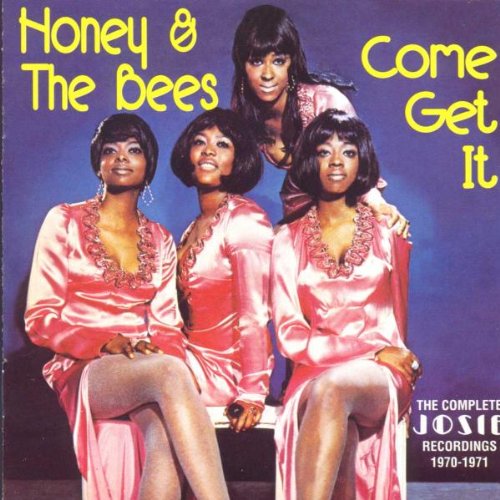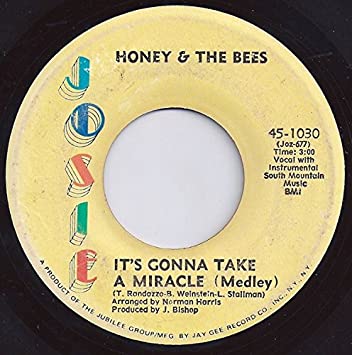HONEY & THE BEES

In 1962, Cassandra Ann Wooten and Gwendolyn Oliver were 13-year-old students at Simon Graty High School in Philadelphia, where they sang with a group called the Superiorettes. The group broke up after graduation. By 1965, the duo had teamed up with Jean Davis, who was four years older and an alumnus of Simon Graty. Rounding out the line-up was Nadine Felder, 17, of nearby William Penn High School. They thought about calling themselves Sugar & The Spices, but found out there was already a group with that name. Instead, they went with the Yum Yums and made their 45 RPM debut on ABC Records with “Looky, Looky” / “Gonna Be a Big Thing.” The single saw no action, even in a cover version of the B-side by the better-known Sapphires (“Who Do You Love” 1964).
After their inauspicious debut, the ladies changed their name to Honey & The Bees. On May 1, 1965, a single came out on Academy Records under that name, but it was a different line-up with none of the members cited above. Still, “Inside O’ Me” / “Two Can Play the Same Game” received a four-star rating from Billboard magazine.
By 1966, Wooten, Oliver, Davis and Felder were on the Philadelphia-based Arctic label, run by disc jockey Jimmy Bishop—who also managed the group. Though Arctic released five singles on Honey & The Bees, Bishop’s primary focus was on labelmate Barbara Mason, who had given the label its biggest hit in 1965’s “Yes, I’m Ready.” Consequently, the group’s output there had no commercial success.
Bishop ended Arctic in 1969 and leased the group’s holiday single, “Jing-Jing-a-Ling” / “Auld Lang Syne,” to Chess Records in Chicago. Despite the festive A side, the Christmas market reacted with indifference. Undeterred by their lack of hits, Honey & The Bees polished their live act. All four members worked up dance routines and comedy bits, while Jean Davis indulged her penchant for design with exotic and eye-catching outfits that made Honey & The Bees a glamorous live draw. They toured with Jerry Butler and later James Brown—whose musical director, Fred Wesley, became smitten with Gwendolyn Oliver. They later got married.
Though he no longer ran his record label, Jimmy Bishop remained the group’s manager. In 1970, he got them signed to Josie Records, which had produced hits on acts like Cadillacs (“Speedo,” 1955), the Chips (“Rubber Biscuit,” 1956), Bobby Freeman (“Do You Want to Dance,” 1958), J. Frank Wilson & The Cavaliers (“Last Kiss,” 1964), and the Meters (“Cissy Strut,” 1969). Honey & The Bees put out six singles on Josie and an album, Love.
Their 1971 release, “We Got to Stay Together,” was listed in the April 17th issue of Cashbox magazine as a Pick of the Week. That same year, they recorded “It’s Gonna Take a Miracle.” Written by New York music-biz veteran Teddy Randazzo, the ballad was previously a 1965 hit for the Royalettes and would go top ten in a 1982 remake by Deniece Williams. As for Honey & The Bees, it was the closest they ever came to having a hit; but it still didn’t happen.
When Josie went out of business, the group turned up on Bell Records, but neither of their two singles there did anything. By now, Honey & The Bees had had enough and threw in the towel. While Jean Davis and Nadine Felder would leave the music business, Cassandra Ann Wooten and Gwendolyn Oliver would team up with Cheryl Mason-Jacks. Together they became the Ritchie Family, a disco act who enjoyed a pair of top twenty hits: “Brazil” (1975) and “The Best Disco in Town” (1976). By the end of the ‘70s, Wooten and husband Fred Wesley were members of Parliament-Funkadelic.
Nadine Felder’s brother, Alan, who co-authored Honey & The Bees’ second Arctic release, went on to become a big name in the Philly Soul explosion of the 1970s. He died in November 1999 at age 56.
Singles discography:
“Looky, Looky” / “Gonna Be a Big Thing” (The Yum Yums - ABC, 1965)
“I’m Confessin’” / “One Time Is Forever” (Arctic, 1966)
“Love Addict” / “I’ll Be There” (Arctic, 1969)
“Together Forever” / “Dynamite Exploded” (Arctic, 1969)
“Sunday Kind of Love” / “Do That Thing” (Arctic, 1969)
“Jing-Jing-a-Ling” / “Auld Lang Syne” (Chess, 1969)
“Make Love to Me” / “Please Have Mercy Baby” (Josie, 1970)
“Help Me (Get Over My Used to Be Lover)” / “Please Have Mercy Baby” (Josie, 1970)
“Make Love to Me Baby” / “People Need Each Other” (Josie, 1970)
“Come Get It” / “Love Can Turn to Hate” (Josie, 1970)
“We Got to Stay Together” / “Help Me (Get Over My Used to Be Lover)” (Josie, 1971)
“It’s Gonna Take a Miracle” / “What About Me” (Josie, 1971)
“That’s What Boys Are Made For” / “Has Somebody Taken My Place” (Bell, 1972)
“Leave Me Alone” / “Song for Jim” (Bell, 1972)

